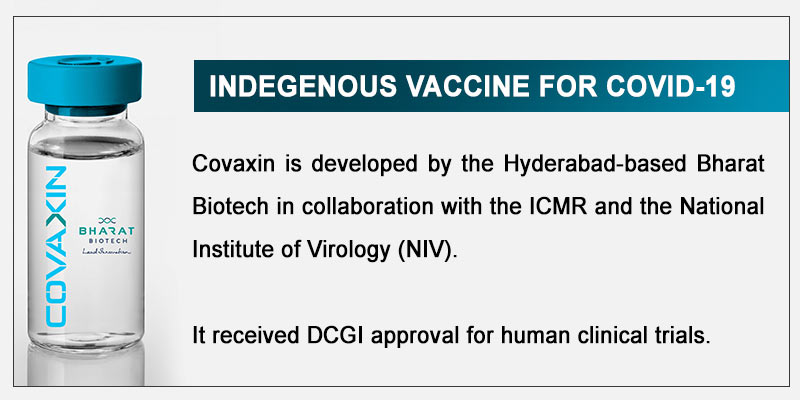- India
- Jul 03
ICMR plans to launch Covaxin by Aug 15
Aiming to launch an indigenous COVID-19 vaccine by August 15, the Indian Council of Medical Research (ICMR) has written to select medical institutions and hospitals to fast-track clinical trial approvals for the vaccine candidate Covaxin being developed in collaboration with Bharat Biotech.
How is the vaccine developed?
The COVID-19 vaccine candidate Covaxin, developed by the Hyderabad-based Bharat Biotech (BBIL) in collaboration with the ICMR and the National Institute of Virology (NIV), had recently got the nod for human clinical trials from the Drugs Controller General (India).
The vaccine is derived from a strain of SARS-CoV-2 isolated by ICMR-National Institute of Virology. Pune-ICMR and BBIL are jointly working for the preclinical as well as clinical development of this vaccine.
What is meant by clinical trial?
Clinical trials of new drugs are conducted on human subjects in the country to discover or verify the clinical, pharmacological and adverse effects with the objective of determining their safety and efficacy.
The Drugs and Cosmetics Rules provide that clinical trials for a new drug,
whether for clinical investigation or any clinical experiments, are required to be conducted under and in accordance with the permission granted by the Drugs Controller General (India).
When will the clinical trials begin?
Twelve clinical trial sites have been identified at present and the apex health research body has asked the medical institutions and principal investigators to ensure that the subject enrolment is initiated no later than July 7.
Noting that this was the first indigenous vaccine being developed by India, ICMR director general Balram Bhargava in his letter to principal investigators of the 12 sites said that it is one of the “top priority projects which is being monitored at the top-most level of the government”.
Launch planned for August 15
According to the ICMR, Covaxin is slated to be launched on August 15.
“It is envisaged that the vaccine will be launched for public health use latest by August 15, 2020, after completion of all clinical trials. BBIL is working expeditiously to meet the target. However, the final outcome will depend on the cooperation of all clinical trial sites involved in this project,” ICMR DG wrote in a letter to the 12 hospitals chosen as sites for a clinical trial for the vaccine.
Human clinical trials may take time
Vaccine development is a long-drawn and time-consuming process, and it sometimes takes up to a decade to develop a safe and effective vaccine.
Researchers have to test the vaccine for safety and efficacy. To test the efficacy, however, requires doing human challenge studies, and recruiting subjects for it can be a challenge.
Bharat Biotech co-founder and joint managing director Suchitra Ella said that the initial phases of the human trials will commence mid-July and will take at least three months for completion. Ella had given a timeline of early 2021 for the vaccine to be rolled out.
Zydus Cadila gets nod for human clinical trials
Another potential COVID-19 vaccine indigenously developed by the Ahmedabad-based Zydus Cadila Healthcare Ltd has got nod from the DCGI for human clinical trials.
The approval process was fast-tracked following recommendation by the subject expert committee on COVID-19, considering the emergency and unmet medical need during the pandemic.
Zydus announced that it’s plasmid DNA vaccine candidate for COVID-19 (ZyCoV-D) developed indigenously at its Vaccine Technology Centre in Ahmedabad has successfully completed the preclinical phase.
“With ZyCoV-D, the company has successfully established the DNA vaccine platform in the country using non-replicating and non-integrating plasmid carrying the gene of interest making it very safe. Zydus has already manufactured clinical GMP batches of the vaccine candidate and plans to initiate the clinical trials in July 2020 across multiple sites in India in over 1000 subjects,” the company’s statement said.
Drugs Controller General of India
The Central Drugs Standard Control Organisation (CDSCO) headed by the Drugs Controller General (India) is the central authority for regulating the quality of drugs marketed in the country under the Drugs and Cosmetics Act, 1940.
The mission of CDSCO is to safeguard and enhance the public health by assuring the safety, efficacy and quality of drugs, cosmetics and medical devices.
The CDSCO with its headquarters in New Delhi has six zonal offices situated at Mumbai, Ghaziabad, Kolkata, Chennai, Ahmedabad and Hyderabad. Also, there are seven sub-zonal offices, seven Central Drugs Testing Laboratories and 13 airport & sixteen seaport offices (including inland container depots).
Regulatory control over the import of drugs, approval of new drugs and clinical trials, meetings of Drugs Consultative Committee (DCC) and Drugs Technical Advisory Board (DTAB), approval of certain licenses as Central License Approving Authority are major functions of CDSCO.
Manorama Yearbook app is now available on Google Play Store and iOS App Store

